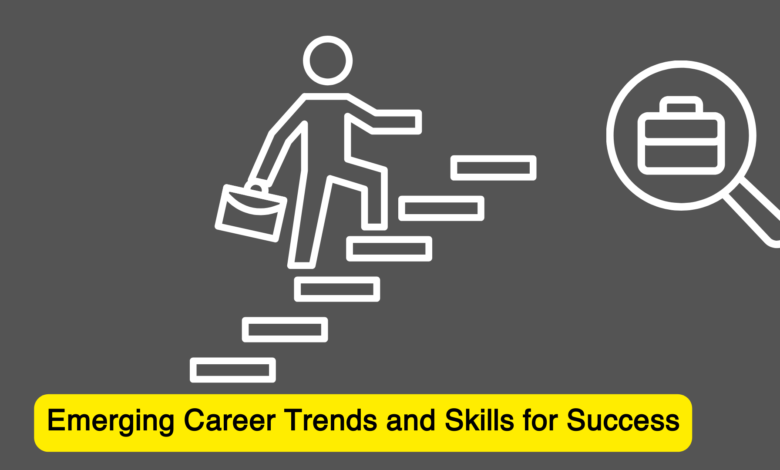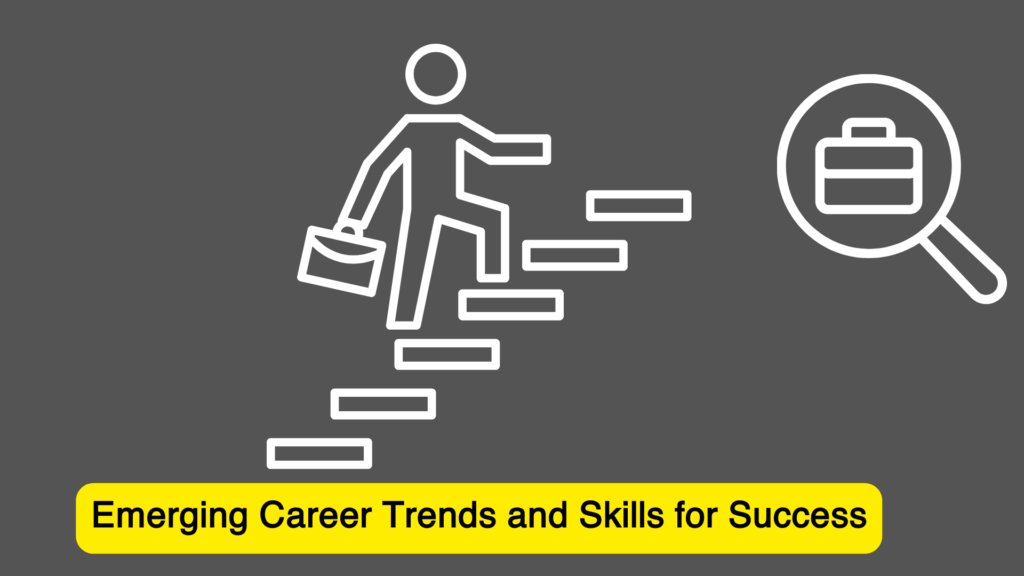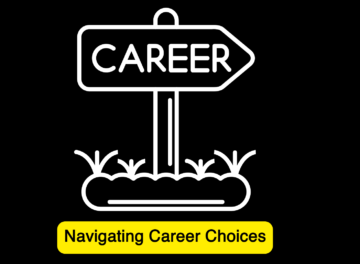The Future of Work: Emerging Career Trends and Skills for Success

The future of work is a topic of great interest and significance as technological advancements, societal shifts, and economic changes continue to reshape the job market. As we move further into the digital age, new career opportunities are emerging, while traditional roles are evolving or becoming obsolete. This article explores the key trends shaping the future of work and the essential skills needed to thrive in this dynamic environment.

Emerging Career Trends
- The Rise of Remote Work and the Gig Economy
The COVID-19 pandemic accelerated the shift towards remote work, making it a permanent fixture in many industries. Companies have embraced flexible work arrangements, allowing employees to work from home or other locations. This trend has also fueled the growth of the gig economy, where individuals take on freelance, contract, or part-time work instead of traditional full-time employment. The gig economy offers flexibility and autonomy, but it also presents challenges such as job security and access to benefits.
- Automation and Artificial Intelligence
Automation and artificial intelligence (AI) are transforming industries and changing the nature of work. Routine tasks and manual labor are increasingly being automated, leading to the displacement of certain jobs. However, automation also creates new opportunities in areas such as AI development, robotics, and machine learning. Workers with skills in these fields are in high demand as businesses seek to leverage technology for efficiency and innovation.
- Sustainability and Green Jobs
As awareness of environmental issues grows, so does the demand for sustainable practices and green jobs. Careers in renewable energy, environmental science, and sustainable design are on the rise. Companies are also investing in corporate social responsibility (CSR) initiatives, creating roles focused on sustainability and ethical practices. The transition to a greener economy presents opportunities for those passionate about environmental conservation and innovation.
- Healthcare and Biotechnology
The healthcare and biotechnology sectors are experiencing rapid growth due to an aging population, advancements in medical technology, and increased focus on health and wellness. Careers in healthcare, including nursing, telemedicine, and medical research, are in high demand. The biotechnology industry is also expanding, with opportunities in genetic engineering, pharmaceuticals, and medical devices. These fields offer promising career prospects for those interested in science and healthcare.
- Digital Marketing and E-commerce
The rise of digital platforms has transformed marketing and retail. Digital marketing has become a crucial component of business strategy, encompassing social media marketing, search engine optimization (SEO), content marketing, and influencer partnerships. E-commerce is also booming, with more consumers shopping online. Careers in digital marketing, e-commerce management, and data analytics are growing as companies seek to enhance their online presence and reach.
Essential Skills for the Future of Work
- Digital Literacy and Technological Proficiency
As technology continues to advance, digital literacy is becoming a fundamental skill for the future workforce. Understanding and navigating digital tools, software, and platforms is essential for most professions. Technological proficiency also includes coding, data analysis, and familiarity with AI and automation. Workers who can adapt to new technologies and leverage them effectively will be better positioned for success.
- Critical Thinking and Problem-Solving
Critical thinking and problem-solving skills are vital in an increasingly complex and dynamic work environment. The ability to analyze information, think critically, and develop innovative solutions is highly valued across industries. These skills enable individuals to navigate challenges, make informed decisions, and drive positive outcomes. Developing a problem-solving mindset is essential for adapting to changing circumstances and identifying opportunities.
- Emotional Intelligence and Interpersonal Skills
Emotional intelligence (EQ) refers to the ability to understand and manage one’s emotions and the emotions of others. EQ is crucial for effective communication, teamwork, and leadership. Interpersonal skills, including empathy, active listening, and conflict resolution, are also essential for building strong relationships and fostering a positive work environment. As automation and AI handle more technical tasks, emotional intelligence will become a key differentiator for human workers.
- Adaptability and Resilience
The future of work is characterized by rapid change and uncertainty. Adaptability and resilience are critical skills for navigating these challenges. Adaptability involves being open to new ideas, embracing change, and learning continuously. Resilience is the ability to bounce back from setbacks and maintain a positive attitude in the face of adversity. Workers who can adapt to new situations and overcome obstacles are more likely to thrive in a dynamic job market.
- Creativity and Innovation
Creativity and innovation are essential for driving growth and staying competitive in the modern economy. Creative thinking involves generating new ideas, challenging the status quo, and approaching problems from different perspectives. Innovation requires the ability to implement creative solutions and turn ideas into tangible outcomes. In an era of automation, human creativity remains a unique and valuable asset that cannot be easily replicated by machines.
- Cultural Competence and Global Awareness
In an increasingly globalized world, cultural competence and global awareness are important skills for the workforce. Cultural competence involves understanding and respecting diverse cultures, perspectives, and practices. It is crucial for effective communication and collaboration in multicultural settings. Global awareness includes an understanding of global trends, economic dynamics, and geopolitical issues. Workers with these skills can navigate cross-cultural interactions and contribute to global business strategies.
Preparing for the Future of Work
- Continuous Learning and Professional Development
Lifelong learning is essential for staying relevant in the ever-changing job market. Individuals should seek opportunities for continuous learning and professional development, whether through formal education, online courses, workshops, or self-study. Staying updated with industry trends, acquiring new skills, and earning certifications can enhance career prospects and open doors to new opportunities.
- Building a Strong Professional Network
Networking is a valuable tool for career growth and advancement. Building a strong professional network involves connecting with colleagues, industry professionals, and mentors. Networking can provide access to job opportunities, industry insights, and career advice. Attending conferences, joining professional organizations, and engaging in online communities are effective ways to expand your network and stay connected.
- Pursuing Cross-Functional Skills
As job roles become more interdisciplinary, cross-functional skills are increasingly valuable. These skills allow individuals to work across different areas of a business and understand how various functions interact. For example, a marketing professional with a background in data analytics can better understand consumer behavior and optimize marketing strategies. Pursuing cross-functional skills can enhance your versatility and make you a more attractive candidate to employers.
- Embracing Entrepreneurship and Intrapreneurship
Entrepreneurship and intrapreneurship are becoming more prevalent in the future of work. Entrepreneurship involves starting and running your own business, while intrapreneurship involves driving innovation and initiatives within an organization. Both paths require creativity, risk-taking, and strategic thinking. Embracing entrepreneurial thinking can lead to new business ventures, innovative projects, and leadership opportunities.
- Focusing on Work-Life Balance and Well-Being
As the lines between work and personal life blur, prioritizing work-life balance and well-being is crucial. Maintaining a healthy work-life balance can prevent burnout and improve overall job satisfaction. It’s important to set boundaries, practice self-care, and manage stress effectively. Employers are also recognizing the importance of employee well-being and offering flexible work arrangements, wellness programs, and mental health support.
The Impact of Technology on the Future of Work
- The Role of Artificial Intelligence and Automation
Artificial intelligence and automation are transforming the workplace, affecting job roles and industries. While automation can increase efficiency and productivity, it also raises concerns about job displacement. However, AI and automation also create new opportunities for roles in AI development, machine learning, and data analysis. Workers need to adapt to these changes by developing skills in AI, data science, and other related fields.
- The Influence of Remote Work and Digital Collaboration
Remote work and digital collaboration have become integral parts of the modern workplace. The rise of remote work has led to the adoption of digital tools and platforms for communication and collaboration. This trend has also highlighted the importance of digital literacy and cybersecurity. As remote work becomes more common, companies are investing in technology infrastructure and developing policies to support remote employees.
- The Growth of E-commerce and Digital Marketing
E-commerce and digital marketing are rapidly growing industries driven by advancements in technology and changing consumer behavior. The shift towards online shopping has increased the demand for professionals in e-commerce management, digital marketing, and data analytics. Understanding digital marketing strategies, SEO, and social media platforms is essential for businesses to succeed in the digital marketplace.
Conclusion
The future of work is shaped by technological advancements, societal changes, and evolving job market trends. As new career opportunities emerge, individuals must adapt to these changes by developing essential skills and embracing lifelong learning. The ability to navigate the digital landscape, think critically, and collaborate across cultures will be crucial for success. While technology will continue to transform industries, human skills such as creativity, emotional intelligence, and adaptability will remain invaluable.
By staying informed about industry trends, continuously updating skills, and maintaining a growth mindset, individuals can thrive in the dynamic world of work. The future of work offers exciting possibilities and challenges, and those who embrace change and innovation will be well-positioned for long-term career success.



Real Estate I truly appreciate your technique of writing a blog. I added it to my bookmark site list and will
Real Estate I appreciate you sharing this blog post. Thanks Again. Cool.